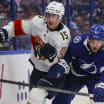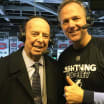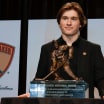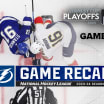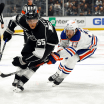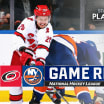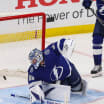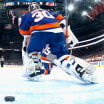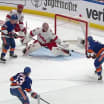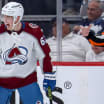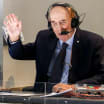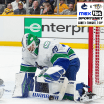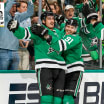Mailbag: Wild need game-breaker, Toews' future with Blackhawks
NHL.com's Dan Rosen answers weekly questions
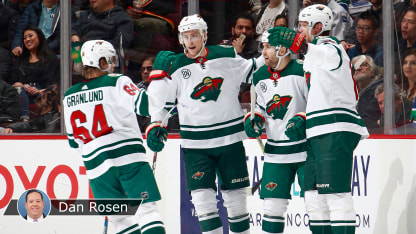
The Minnesota Wild are falling and could be pushing for 12th or 13th in the Western Conference by Christmas. What does Paul Fenton do? Waiting until Christmas will be too late. -- @sorr0504
The Wild had a good win, a much-needed 7-1 victory against the Montreal Canadiens on Tuesday, but it doesn't change the fact that they need a game-breaker, preferably one with a right-handed shot, someone who can ignite them and provide the surge they so clearly need. Can they get one (Artemi Panarin?) for what they have to offer? That's a question only Paul Fenton, Minnesota's first-year general manager, can answer. I've been saying they need a game-breaker for a while now. That they don't have one is the reason I didn't pick them to make the Stanley Cup Playoffs. That player may not make the ultimate difference in the Wild turning things around this season (that begins and ends with goalie Devan Dubnyk getting back to his all-star form), but they desperately need a player who can change a game with one play, one speed burst, one out-of-nowhere dynamic move that gets people talking, that makes opposing teams fearful.
MIN@VAN: Dubnyk uses glove to stone Pettersson
Among the players struggling who could be part of a package that would bring back a gamechanger are forwards Charlie Coyle and Nino Niederreiter. But how valuable are those players right now? It's a fair question since both have struggled. Coyle, a first-round pick (No. 28) in the 2010 NHL Draft, has 14 points (five goals, nine assists) this season after he had 37 (11 goals, 26 assists) in 66 games last season. Niederreiter, the No. 5 pick in 2010, has 16 points (five goals, 11 assists) and is minus-9. He had 32 points (18 goals, 14 assists) in 63 games last season.
Fenton may have to make his first bold move as GM soon. I agree, he could be playing a dangerous game if he waits too much longer. Fenton, though, does have something going in his favor: As a first-year GM, he's not emotionally attached to any of the players or coaches, which means no one is safe.
The Pittsburgh Penguins have had incredible moments lately where they seem like they are putting it back together but then follow it up with inconsistencies. What do you see as their primary issues and in what ways could they solve it to get back to Stanley Cup-winning form? -- @GoldenSaucerGuy
I had a conversation about this exact topic with Sidney Crosby on Monday, before the Penguins' 2-1 shootout win against the New York Islanders at Nassau Coliseum that moved them to 3-0-1 in their past four games and 6-2-2 in 10 since Nov. 21. They're playing better of late because they're playing with more urgency, with an aggressiveness that is key to their success. That is basically what Crosby said. For the Penguins, it comes down to being aggressive and being willing to take a risk to make a play. They're good when they're aggressive, but when they sit back and get passive, that's when they make mistakes and have the game come at them. Crosby mentioned how they're not mistakes that can be covered up, that they're mistakes that lead to breakaways, mistakes in defensive zone coverage that lead to the slot being wide open for the other team. We saw it in the game against the Islanders on Monday. Derick Brassard's turnover in the neutral zone led to a quick tic-tac-toe goal for New York. This isn't to give Pittsburgh's goaltending a free pass, but it's hard to have consistent goaltending when you're giving teams freebies. Casey DeSmith stopped a couple of freebies the Penguins gave the Islanders. It was huge in helping Pittsburgh squeeze out that win.
Crosby said he thinks the Penguins get this way for a variety of reasons, including inconsistent line combinations (injuries are a big part of why, although he didn't say that) and when they get down early in a game, perhaps because their aggressiveness got the best of them, and find themselves chasing. But let's not lose sight of the fact that they've climbed their way back into the playoff conversation, that they're right in the mix again because they're finding ways to get points even if they're not playing their absolute best.
Would you consider trading Jonathan Toews if this fall from the Chicago Blackhawks continues? -- @sidkid80
I would, yes. But I'm not Blackhawks president John McDonough, nor am I general manager Stan Bowman. I don't know if it's something they're considering now, with Toews in the fourth year of an eight-year contract. I'd be considering it. It's not because of my lack of belief in Toews. It's more because I believe the Blackhawks need a reboot and trading Toews would be the trigger. He's 30 years old. He's a legend in Chicago. But that doesn't mean the Blackhawks shouldn't explore trading him to make room for the next generation. They fired Joel Quenneville, another Chicago legend, with that same philosophy in mind. It would take a lot to get it done, though, including cooperation from Toews, and the Blackhawks probably wouldn't get the type of value in return they'd want because a team taking on Toews is taking on his contract too.
CGY@CHI: Toews shows off speed on breakaway goal
That's not the point, though. The point is the Blackhawks can't stay with the status quo. It's not working. They're sputtering now, but their struggles go back to getting swept by the Nashville Predators in the 2017 Western Conference First Round. They missed the Stanley Cup Playoffs last season. They're on track for another quiet spring. It's also not easy to find reasons for why the Blackhawks could get this turned around quickly. They had a near decade-long run of excellence. It's over. They must recognize that now. They can't have any untouchables anymore. Everything has to be on the table.
If the Philadelphia Flyers decide to turn to the market to find a long-term solution in net, then A) would Sergei Bobrovsky be a potential target, and B) is that kind of thinking realistic? -- @briantodd34
I don't think it's realistic because the Flyers have Carter Hart and he's supposed to be their No. 1 goalie of the future. Hart is playing with Lehigh Valley in the American Hockey League. I don't see why new GM Chuck Fletcher would deviate from the plan to eventually grow with Hart, especially since he'd be on an entry-level contract, providing the Flyers with cap flexibility to improve in other areas. Bobrovsky, if he's traded by the Columbus Blue Jackets, will likely cost any team acquiring him multiple assets, including the potential for a first-round pick, if not two. And that would just guarantee the team acquiring him would have him for the rest of this season.
WSH@CBJ: Bobrovsky robs Kuznetsov with his glove
Bobrovsky can become an unrestricted free agent after the season and he's expected to seek a long-term, expensive contract. The Flyers would improve in the short term by acquiring him, but it could be too costly for a rental goalie, especially if the plan is to grow with Hart. Considering that plan, it also wouldn't make sense for them to give a long-term contract to Bobrovsky. The Flyers, though, could and should be in the market for short-term help to bridge the gap between now and when Hart is ready. Jimmy Howard, the 34-year-old goalie for the Detroit Red Wings, could be the perfect stopgap, whether the Flyers attempt to trade for him this season or try to sign him in the offseason.
I thought the St. Louis Blues were one of the teams that took pretty impressive steps forward in the offseason. What exactly has gone wrong for them? -- @SpencerRiggi
I thought the same thing about the Blues. I picked them to make the playoffs. I thought they'd be one of the more dominant teams in the Western Conference because of their improved center depth with Ryan O'Reilly, Tyler Bozak and rookie Robert Thomas joining Brayden Schenn down the middle. I was hopeful that Jake Allen would bounce back and be able to thrive as an unquestioned No. 1 goalie. I thought they had enough firepower, especially with Vladimir Tarasenko, who should be a 40-goal scorer every season.
It hasn't happened. The Blues haven't been able to get their game to click at all levels. Let's look at splits for examples. In 14 games through Nov. 9, they were giving up too many goals (3.43 per game) at a time when they were scoring enough to win (3.57 per game) and their power play was clicking (28.6 percent). They were 6-5-3. However, at the end of that, they had back-to-back wins, 4-1 against the Carolina Hurricanes and 4-0 against the San Jose Sharks, and I thought they were coming out of it. Nope. They're 5-9-1 in 15 games since. Their goals-against per game dropped to 3.20, but their goals-for per game has gone down to 2.13, with their power play (13.5 percent) being a big culprit. A coaching change from Mike Yeo to Craig Berube on Nov. 20 hasn't solved their problems. If anything, the Blues have gone backward since. The next thing is for them to make moves to change the culture, to rip up the core if necessary. I think the Blues need something seismic, if not to save this season then certainly to change their course for the future.
